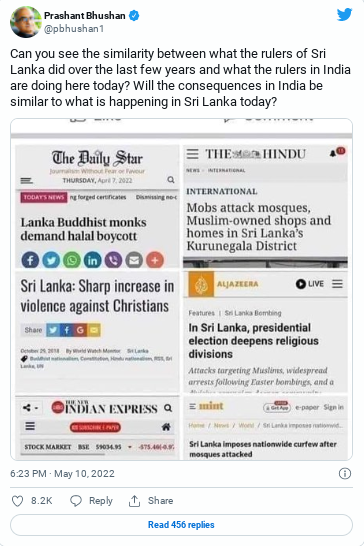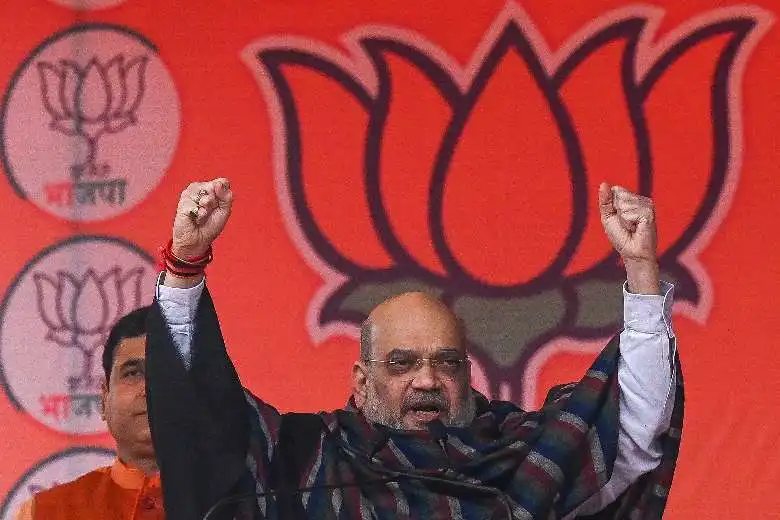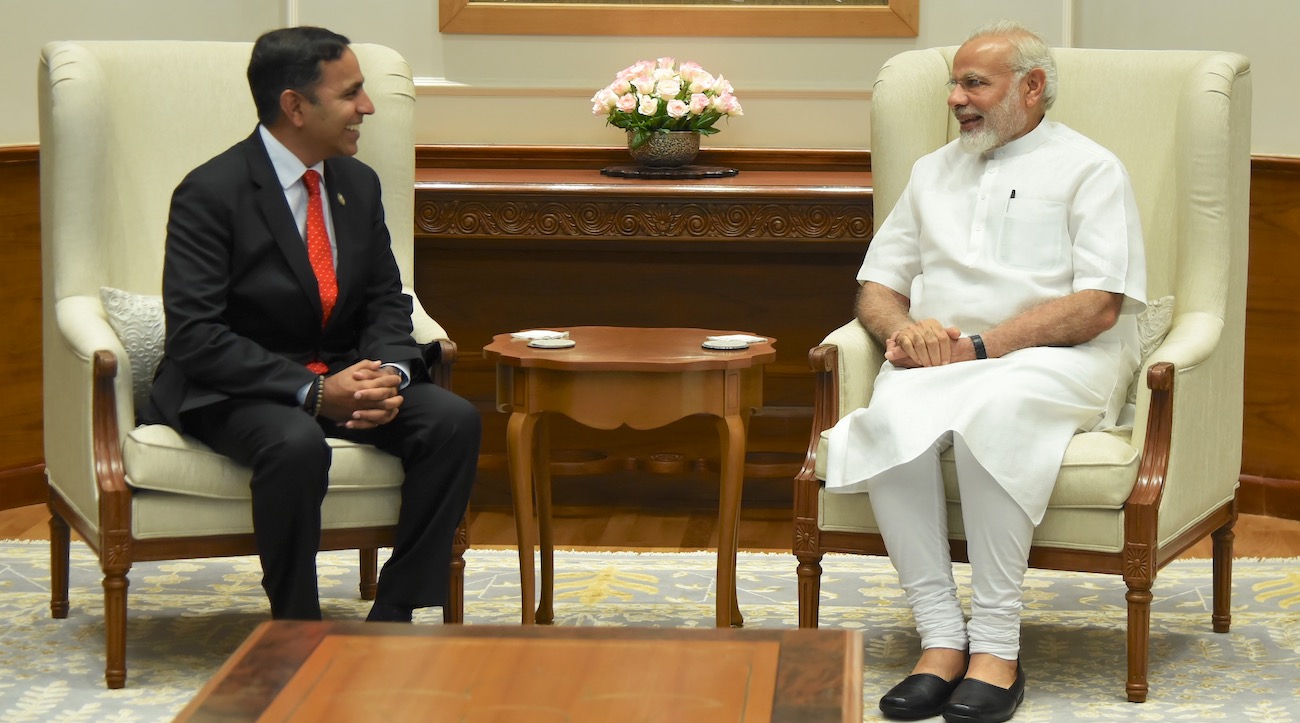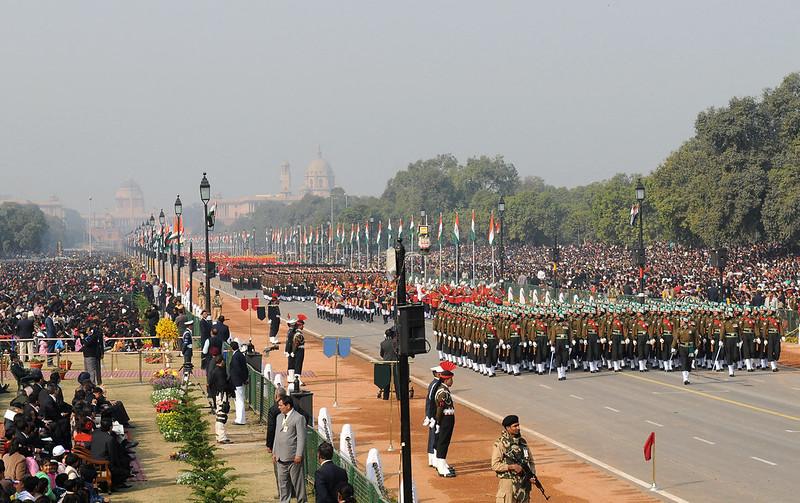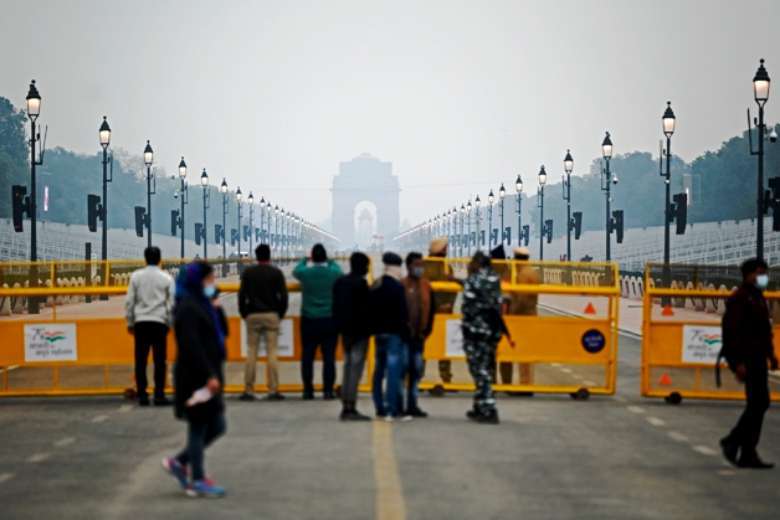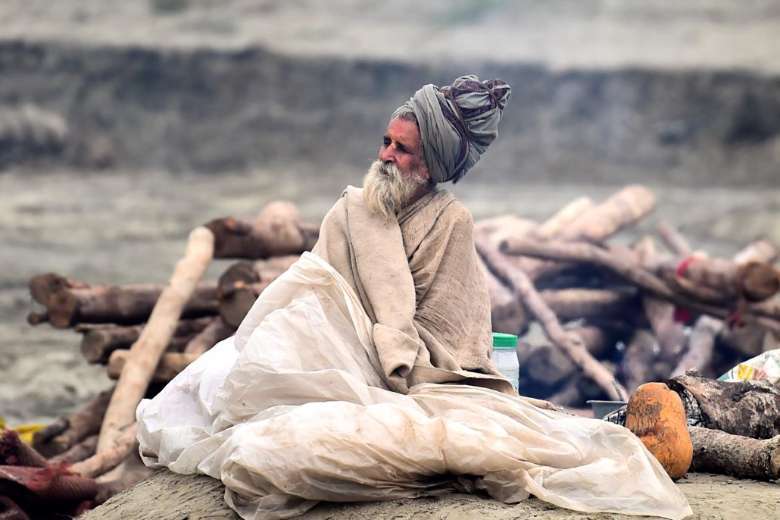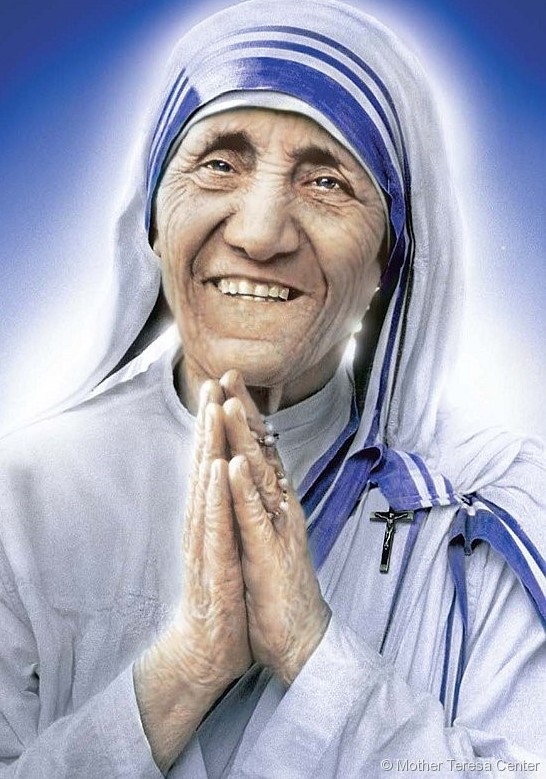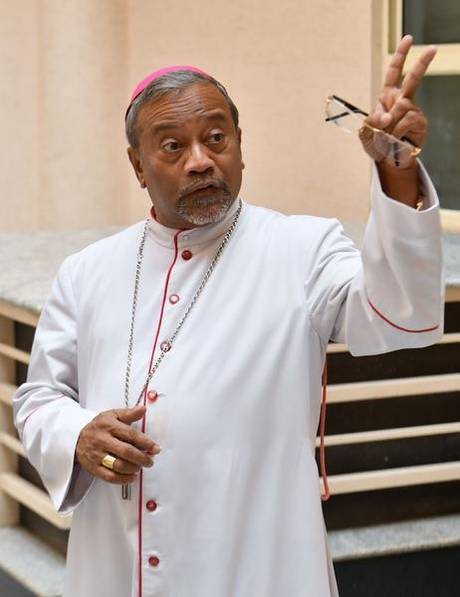Banker issues cryptic tweet as inflation soars, rupee falls
‘Burning Lanka’ tells all what not to do, says Uday Kotak In the backdrop of the country's economic crisis, Kotak Banker Uday Kotak has come out with an intriguing comment as an outbreak of violent civil unrest in neighbouring Sri Lanka forced a regime change in the island nation with the resignation of its Prime Minister, Mahinda Rajapaksa, on Monday. “The Russia Ukraine war goes on and the going gets tough. True test of nations is now. Strength of institutions like the judiciary, regulators, police, government, Parliament will matter. Doing what is right and not populist is crucial. A ‘burning Lanka’ tells all what not to do!” Kotak Mahindra Bank CEO Uday Kotak said in a tweet on Tuesday. Couched in generic terms, there was no explicit indication that this was a rare bit of advice to the Modi government from one of its most ardent supporters. The Modi government has been battling a crisis on several fronts: inflation has shot through the roof and is expected to cross 7.5 per cent — an 18-month high — when the government statisticians come out with the numbers for April on Thursday. Rising food and fuel prices, surging commodity prices, a severe disruption in supply chains, and
A strong push for a Hindi-speaking, Hindu India
Hindi as the national language suits the BJP's wider agenda of establishing a nation of and for Hindus A strong push for a Hindi-speaking, Hindu India Home Minister Amit Shah gestures during an election rally in Uttar Pradesh on Feb. 3. Federal Home Minister Amit Shah, a trusted aide of Prime Minister Narendra Modi, has come all out in support of Hindi as the official language of communication across a multilingual India. Hindi is the mother tongue of around 40 percent of Indians in the northern belt while the rest of its citizens speak over 120 other languages, with English serving as the crucial bridge. Shah made it clear that Hindi should become an “alternative to English” and not the other Indian languages. He wants non-Hindi speakers to start using Hindi while communicating with each other. He also suggested making Hindi flexible by accepting words from other Indian languages to help propagate it. Leaders from Hindi-speaking northern India have been pushing to make Hindi the national language for a long time, hoping to further endear themselves to their voters. But Shah’s remarks at a recent meeting of the parliamentary official language committee are a bit baffling. There is perhaps a communal angle here. The Bharatiya Janata
Understanding politics around Anti-conversion Laws in Adivasis dominated states in India
Anti-conversion laws in India, ironically also known as Freedom of Religion Acts, are state-level laws that have been enacted to regulate religious conversion. To date, Ten states out of twenty-eight states have enacted these laws: Orissa, Madhya Pradesh, Arunachal Pradesh, Gujarat, Chhattisgarh, Himachal Pradesh, Uttarakhand, Jharkhand, Uttar Pradesh and Karnataka. Haryana, this February, has introduced an anti-conversion bill in the Assembly. Recently, Manipur has also shown interest in bringing such laws. The majority of these states have a good number of Adivasi/Tribal populations. So it is intriguing to know why these laws are more familiar to Adivasi dominated states?. But in recent years, it is becoming common across the country, especially where BJP is the ruling party. In this piece, my focus is on Adivasi dominated states. Anti-conversion laws are not a new phenomenon in India, it has a history since the colonial time. Around the 1930s and 1940s, some Hindu princely states enacted these laws to preserve Hindu religious identity out of the fear of the British missionaries. The princely states were Kota, Bikaner, Jodhpur, Raigarh, Patna, Surguja, Udaipur, and Kalahandi. In post-colonial India, despite pressure from Hindu groups to introduce anti-conversion laws at the national level, Nehru rejected such
The Artful Dodger: Rep. Raja Krishnamoorthi’s Unholy Nexus with Hindu Nationalism
The three-term Indian American congressman has long ignored massive violations of human rights and religious freedom in India in deference to his Hindu nationalist benefactors and his friendship with Prime Minister Modi. (The following article was originally published in American Kahani, an ethnic news portal of Indian Americans. To read the article in American Kahani, please click here). For over two years, I have been trying to convince Congressman Raja Krishnamoorthi to stand on the right side of history by condemning the anti-minority policies of the Modi government and by distancing himself from his Hindu nationalist benefactors in the U.S. It started in December 2019 when a report surfaced that he was a keynote speaker at a Hindu nationalist event in Chicago. He claimed that the report was false and that it was an Indian festival where there just happened to be some pictures of Hindu nationalist leaders. He also insisted that he was not in any way associated with Hindu nationalism. In fact, the October 2019 event was to commemorate the 94th birthday of the Rashtriya Swayamsevak Sangh (RSS), and it was organized by the Hindu Swayamsevak Sangh (HSS), the overseas arm of the RSS. On stage were HSS officials as well as
Insults, Isolation, Broken Friendships: Dalit Students Open Up on Caste Discrimination in US
The inclusion of caste in its anti-discrimination policy by the California State Universities is as a major triumph for activists. “Saale cha*** tumhari kismat bahut tez hai, tum America pahunch gaye. Translated, this means, ‘you cha*** – a slur used by ‘upper’ caste members – you’re in luck to have made it to America.’ The casual, casteist insult was one of many Neha Singh grew accustomed to on campus, as a student at California State University a decade ago, where she pursued Bachelor’s and Master’s degrees. At the time, she had no idea whom to complain to, as she wasn’t sure the American university system would understand the Indian caste system. So she held her tongue, avoided revealing she was Dalit, and dropped out of South Asian dance groups on campus after repeatedly being asked what her last name was. The many instances of casteism she recalls on campus include an Indian student talking of how Christianity was not an Indian religion, so all Indian Christians were low-caste converts. “This shocked me,” she says. She is delighted that California State University (CSU) added caste to its anti-discrimination policy earlier this month. CSU is America’s largest four-year public university, spanning 23 campuses with over 480,000 students.
Indian Republic Day Parade: March-Pasts and Rattle of Tanks Don’t Bolster Democracy
(Opinion by M.G. Devasahayam - Retd Army and Indian Administrative Service Officer) A healthy nation reinforces democracy by removing bigotry, arbitrariness, injustice, hate and intolerance, which exist within the country and threaten the unity of people. The slug-fest between the Centre and States over the tableau displays during the Republic Day Parade is back again in full fury. Following the parade’s theme this year—India@75—Tamil Nadu, West Bengal and Kerala submitted their respective tableaux to the Ministry of Defence (MoD), the controlling authority for the parade held on 26 January every year. The Tamil Nadu tableau proposed sketches that depict the contribution of renowned freedom fighters from the state, including VO Chidambaram, Subramania Bharathi, popularly known as Mahakavi Bharathiyar, Rani Velu Nachiyar and other women soldiers. The West Bengal tableau sought to feature Netaji Subhas Chandra Bose and his Indian National Army, whose 125th birth anniversary falls on 23 January. The tableau would have carried portraits of Ishwar Chandra Vidyasagar, Rabindranath Tagore, Swami Vivekananda, Chittaranjan Das, Sri Aurobindo, Matangini Hazra, Birsa Munda and Nazrul Islam. Kerala’s tableau was of the social reformer Sree Narayana Guru and the Jatayu Park monument, the world’s biggest bird sculpture in a national park covering 65 acres over four
John Dayal: Scared of a solemn hymn?
Dropping Mahatma Gandhi's favorite hymn is another move by Narendra Modi to bury India's past Until New Year’s Day, not many people other than Christians in India, Catholics among them, who attend the English Sunday services in their neighborhood church had known of the hymn Abide With Me. With Amazing Grace, it was a favorite of a select few, among them a man called Mohandas Karamchand Gandhi. Today, most Hindus, Muslims, Sikhs and Buddhists with access to English-language media would know the hymn’s title, could have read the solemn verses and even hummed the tune. Narendra Modi, India’s hyper-nationalist and arguably xenophobic prime minister, has had an inadvertently big hand in spreading the hymn among tens of millions of its new admirers. He did this by banning it from the repertoire of the massed military bands whose brass and bagpipes played the tune with stunning impact at the Beating Retreat ceremony held down the Raisina hill at Rashtrapati Bhawan, the residence of the president of India. The Retreat ends the week-long state festivities that mark the birth of the Indian republic on Jan. 26, 1950, after a bloodstained partition and independence from Britain on Aug. 15, 1947. While Pakistan was hived off as a homeland of
India’s year of fear. Rising Hindu nationalism, hate speech and violence pose a real threat to Christians and other non-Hindu groups: John Dayal
It has been a year of fear in India. The trauma of mass deaths in the Covid-19 pandemic — the bodies floating down the holy River Ganges or waiting hours for their turn at cremation grounds — has not faded. By the end of the year, the fear of death in the pandemic was perhaps replaced by an uneasy feeling in the pit of the stomach over fears of being butchered by nationalist fanatic mobs whose baying was heard on Christmas Day. The politicians, government officials and police just looked on, helpless or in complicit silence, as they had done in the spring months of April and May. On Christmas Day, speaking long-distance to the Sikh community that was commemorating one of its gurus, Prime Minister Narendra Modi focused at length on the atrocities committed by medieval Muslim emperors on Hindus and Sikhs. Even as he was speaking, violent Hindu mobs, now called Hindutva elements in a generic and politically correct collective phrase, attacked, churches, congregations in prayer and groups celebrating Christmas in 16 cities and towns across India. The incidents covered states as varied as Haryana, Uttar Pradesh and Delhi in the north to Assam in the far northeast and Karnataka in the
DENIGRATE, DEMONIZE, DIVIDE, DESTROY
(Revised) - Fr Cedric Prakash SJ A very effective strategy of fascists and dictators from time immemorial is to denigrate, demonize, divide and destroy the other! This is particularly true where the 'other' are those who dissent, those who do selfless work which they are unable to do, or simply those they are unable to deal with! The past few weeks in India have seen several examples of how these fascists have been using every possible deed from their violent and dirty bag of tricks to terrorize minorities of the country! The Christians of India have always been a 'soft target' ; in their ascent to power since the late 1990s the BJP and their ilk in the Sangh Parivar- have systematically targeted the community in different ways and all over the country. The 'bogey' of forced conversion, the desecration of sacred objects, the attacks on Christians and their places of worship and institutions, the myriad threats, intimidation and harassments, the spreading of canard- are all part of a wider game plan to polarize the majority community and put Christians in bad light! This past month - particularly, the days before and on Christmas day- has seen a surge of this orchestrated campaign against the Christians in
Is religious conversion a criminal issue?
Addressing cases of incentivised conversion will require a holistic approach The Church is against any form of incentivised conversions. Even in the case of inter-religious marriages registered under the Special Marriage Act, the non-Christian partner is counselled to practise his or her own religion. There is no compulsion to convert to Christianity as religious tolerance is a part of Indian ethos. However, if there are cases of incentivised conversion, is criminal law the solution? In an address to the All Karnataka United Christian Forum for Human Rights (AKUCFHR) on November 19, Peter Machado, the Archbishop of Bangalore, said it was a sin to force anyone to convert. Any conversion had to be from the heart as the Church wanted to increase the quality and not quantity of its faithful. In a letter to the Karnataka Chief Minister, Dr. Machado says, “Thousands of schools, colleges and hospitals are run and managed by Christian community across the State. When lakhs of students are graduating from these institutions year after year and thousands of patients irrespective of caste, creed or colour receive the best medical attention from our hospitals and care centres, let the government prove that even one of them has ever been influenced, compelled





